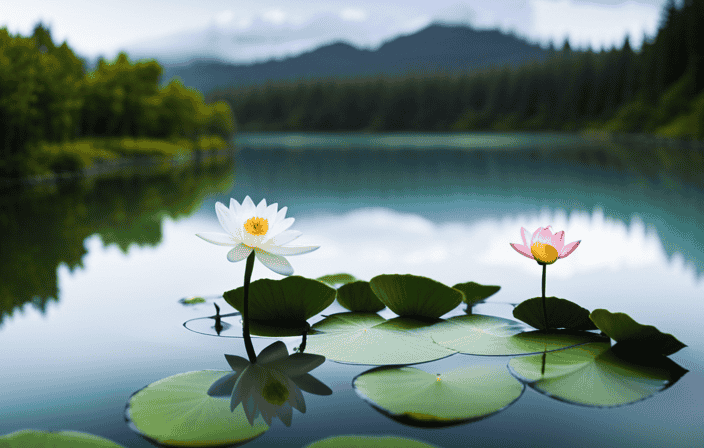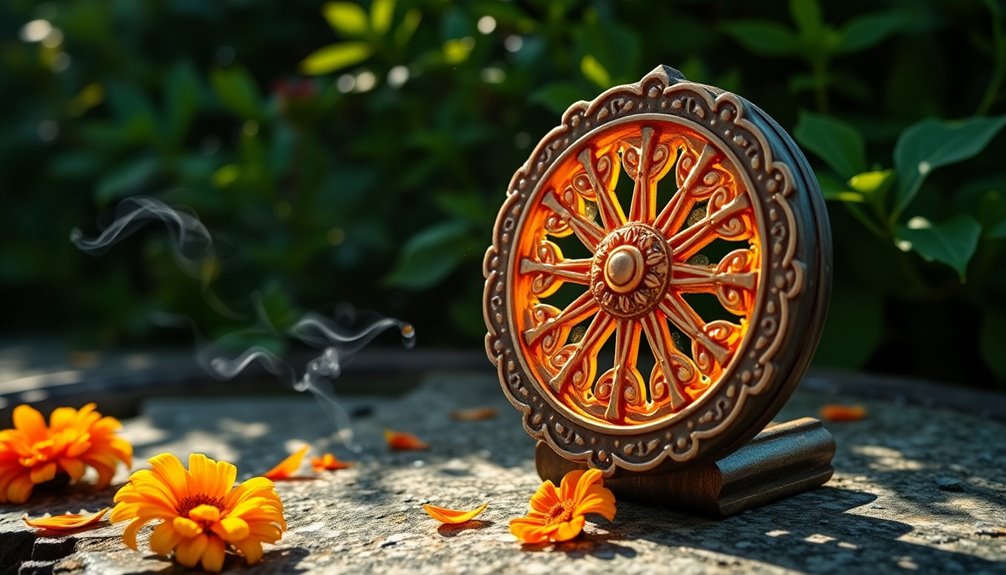Hinduism, which is deeply spiritual and filled with devout worship, delves into a captivating concept called Moksha. This pursuit of spiritual liberation from the continuous cycle of life and death is the cornerstone of the Hindu religion, a belief cherished by over one billion followers worldwide.
Through righteous living and fulfilling their duties, Hindus seek self-realization and unity with the divine.
Join me as we explore Hindu beliefs, their impact on the global religious landscape, and the practices that guide their spiritual journey.
Key Takeaways
- The spiritual concept most embraced by Hindus is the belief in oneness with the universe and unity with the divine.
- Hinduism places a strong emphasis on fulfilling one’s duty (Dharma) and understanding the consequences of one’s actions (Karma).
- The ultimate goal of Hindu spirituality is to achieve Moksha, which is liberation from the cycle of birth and death.
- Hinduism is a diverse religion with various beliefs and practices, influenced by history, mythology, and cultural factors.
What Hindus Believe
I believe that most Hindus embrace the spiritual concept of Moksha, which is the ultimate goal of achieving liberation from the birth and death cycle.
Moksha is a central belief in Hinduism and represents the realization of one’s true self and unity with the divine. It is attained through self-realization, meditation practices, and devotion to a higher power.
Hindus believe that by breaking free from the cycle of birth and death, one can achieve eternal bliss and peace. Moksha is seen as the ultimate fulfillment and liberation from the suffering and limitations of the material world.
While there are other important spiritual concepts in Hinduism, such as Dharma and Karma, Moksha holds a special place as the ultimate goal and aspiration of most Hindus.
Key Spiritual Concept
Dharma, the guiding light of righteous living and fulfilling duty, shines as the beating heart of Hindu spirituality, illuminating the path towards self-realization and liberation.
Within this spiritual concept, Hindus believe in the oneness with divinity and the dissolution of ego. It is through the practice of dharma that one can transcend the limitations of the self and merge with the divine.
By fulfilling our responsibilities and living in alignment with divine law, we can experience a deep sense of connection and unity with the divine. This dissolution of ego allows us to break free from the cycle of birth and death and achieve moksha, liberation from the material world.
Through the practice of dharma, we strive to awaken our spiritual consciousness and realize our true nature as divine beings.
Influence on Hinduism
The influence of history, mythology, and culture shapes the beliefs and practices of Hinduism.
-
Caste system: The hierarchical social structure, based on birth and occupation, greatly impacts Hindu society. It determines an individual’s social status, rights, and privileges.
-
Influence on global religious landscape: Hinduism’s rich history, diverse mythology, and cultural traditions have spread beyond India, influencing the religious landscape worldwide. It has become a significant presence in various parts of the world, with over 1 billion followers globally.
-
Hinduism’s teachings on dharma, karma, and Moksha have resonated with people from different backgrounds, contributing to its global appeal.
-
Hinduism’s emphasis on inclusivity and acceptance has also played a role in its influence on the global religious scene, fostering interfaith dialogue and understanding.
Hindu Practices
Engaging with the local community and participating in festivals are important aspects of Hindu practices. Community engagement allows Hindus to connect with others who share their beliefs and values. It provides a sense of belonging and reinforces the idea of unity and interconnectedness.
Visiting temples is another significant practice in Hinduism. Temples are considered sacred spaces where individuals can offer prayers and seek blessings from the deities. They serve as a place of worship, spiritual reflection, and communal gathering. Temple visits also offer opportunities for Hindus to learn about their religion, engage in rituals, and deepen their connection with the divine.
Overall, these practices play a vital role in fostering a sense of community, promoting spiritual growth, and strengthening one’s relationship with the divine.
Goal of Hindu Spirituality
Achieving Moksha is the ultimate goal of my spiritual journey as a Hindu. Moksha represents liberation from the cycle of birth and death, and it is the state of self-realization and union with the divine.
To attain Moksha, I engage in various spiritual practices such as meditation, devotion to a higher power, and self-reflection. These practices help me deepen my understanding of myself and the world around me, leading to spiritual growth and enlightenment.
By seeking self-realization, I strive to transcend the limitations of the ego and dissolve the barriers that separate me from the divine. Liberation from the birth and death cycle is the ultimate liberation, bringing me closer to the eternal truth and everlasting bliss.
Frequently Asked Questions
How does the caste system and social stratification influence Hindu beliefs and practices?
The caste system and social stratification play a significant role in shaping Hindu beliefs and practices. They have implications on social hierarchy, influencing birth, occupation, and social status, which in turn impact religious rituals, customs, and interactions within the community.
What are some common rituals or traditions followed by Hindus during festivals?
During Hindu festivals, I follow various rituals and traditions. These include visiting temples, participating in religious ceremonies, offering prayers and performing rituals, engaging with the local community, and celebrating with music, dance, and feasts.
How do Hindus view the concept of karma and its role in shaping their lives?
Karma, a cosmic balancing act, shapes our lives and future reincarnations. It’s influenced by our dharma, our moral responsibility. Hindus believe that through good actions, we can attain moksha, liberation from the cycle of birth and death.
What are some of the main differences between the worship of Lord Shiva in the North and Lord Vishnu in the South?
The worship of Lord Shiva in the North and Lord Vishnu in the South differs due to the impact of regional culture. In the North, Shiva is worshipped as the supreme deity, while in the South, Vishnu is seen as the preserver of the universe.
How do Hindu beliefs and practices vary across different regions and communities within India?
Regional variations and cultural diversity within India result in diverse Hindu beliefs and practices. For example, in the North, Lord Shiva is worshipped while in the South, Lord Vishnu is revered. This reflects the rich tapestry of Hindu traditions across the country.
Conclusion
In conclusion, Hindu beliefs center around the pursuit of Moksha, which represents liberation from the cycle of birth and death. Through righteous living and fulfilling their duties, Hindus aim to achieve self-realization and oneness with the divine. This spiritual concept has greatly influenced Hinduism and has shaped its practices and rituals.
With over 1 billion followers globally, Hinduism’s influence on the religious landscape cannot be underestimated. Hinduism’s emphasis on Moksha and the pursuit of spiritual enlightenment sets it apart from other religions. As the saying goes, ‘The path to Moksha is paved with righteous actions and devotion to the divine.’










